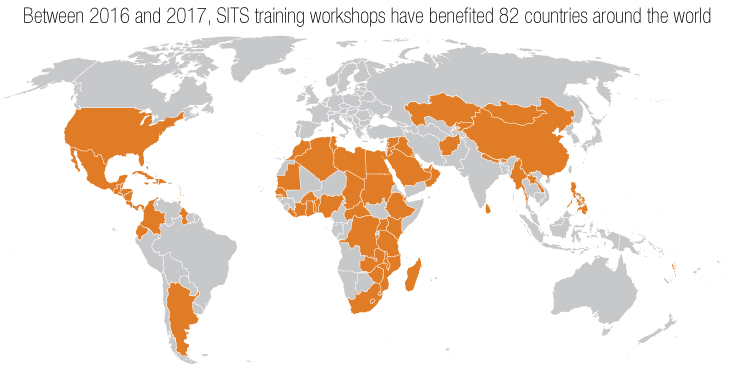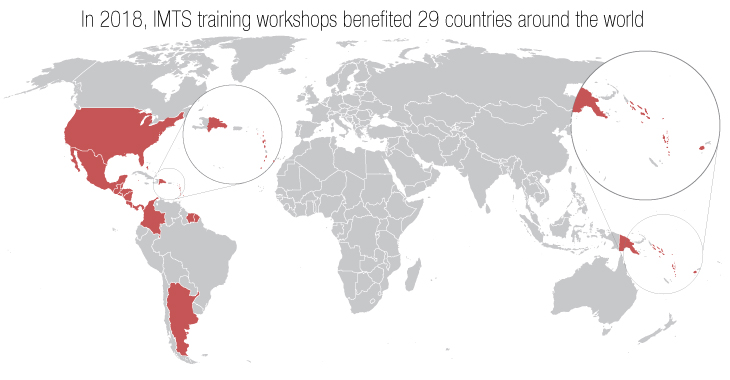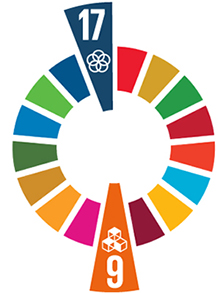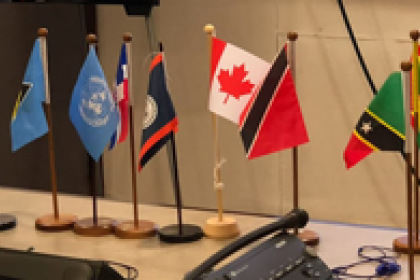The statistics e-learning tools are jointly developed by the UNCTAD’s Statistics and Information Branch and the 'Train-for-Trade' Knowledge Development Branch.
Two e-learning tools on statistics are available:
- Trade-in-Services
- Merchandise Trade
The content for both UNCTAD e-learning tool on statistics were developed by UNCTAD in partnership with the World Trade Organization and the United Nations Statistical Division (UNSD) and in collaboration with the ‘Statistics of International Trade’ Inter-Agency Task Force.
Trade-in-Services
This e-learning tool is an online capacity development tool or training course designed to raise awareness of Trade-in-Services statistics and concepts, enhance statisticians’ ability to compile these statistics by making good quality training materials available online, and to help them better understand the manual on Statistics of International Trade-in-Services (MSITS 2010).
Apart from statistical compilers and producers of Trade-in-Services statistics, it is envisaged that the course will also be of immediate benefit to other statisticians compiling related statistics, such as, balance of payments (BoP), international merchandise trade statistics, business statistics or national cccounts, whether they work in a national statistical office or a central bank. It is also anticipated that the course will be useful for some users, such as analysts in government ministries – in particular, those dealing with tourism, trade, economy or finance – and trade negotiators, economists and lawyers dealing with trade related issues.
The online tool comprises of 6 modules:
- Importance of Statistics on International Trade in Services and main concepts
- Setting up Prerequisite for Data Collection and Compilation
- Data Sources and Collection
- Data Compilation (BOP STIS)
- Data Compilation (FATS)
- Dissemination and Analysis
The English version of this tool was successfully launched in early 2016 and has already been used as preliminary training in preparation for follow-up face-to-face training workshops, including workshops conducted jointly with the Association of Caribbean States (ACS), the Secretaría de Integración Económica Centroamericana (SIECA) and UNCTAD. It has also been used jointly by WTO and UNCTAD to deliver bespoke courses for Least Developed Countries.
Since launching this tool 253 participants, including 132 women, from 47 countries were trained using the e-learning tool in 2016. Twenty-two participants from 19 countries also participated in a follow-up face-to-face workshop. In 2017, 111 participants, of which 36 were women, from 56 countries undertook e-learning. Twenty-eight participants from 22 countries also participated in follow-up face-to-face workshops.
A French version of this tool is now in development and is expected to be launched by December 2018.

Merchandise Trade
This e-learning tool is an online capacity development tool or training course designed to raise awareness of International Merchandise Trade statistics (IMTS) and concepts, enhance statisticians’ ability to compile these statistics by making good quality training materials available online, and to help them better understand the manual on International Merchandise Trade statistics (IMTS): Concepts and Definitions 2010. The main objective is to enhance statisticians’ ability to apply these concepts in practice, by helping to establish adequate collection systems, and improve statistical compilation processes. Furthermore, the course emphasizes the importance of quality, metadata, timely dissemination, and links to economic analysis and national policy objectives.
Apart from statistical compilers and producers of international merchandise statistics, it is envisaged that the course will also be of immediate benefit to other statisticians compiling related statistics, such as, balance of payments (BoP), international trade-in-services statistics, business statistics or national accounts, whether they work in a national statistical office, ministry of trade or customs authority. It is also anticipated that the course will be useful for other users, such as central bankers, analysts in government ministries – in particular, those dealing with trade, economy and finance – and trade negotiators, economists and lawyers dealing with trade related issues.
The online tool comprises of 6 modules:
- Conceptual framework
- Institutional arrangements
- Production and compilation
- Metadata and quality
- Dissemination and analyses
- New areas of work
The English version of this tool was successfully launched in early 2018 and has already been used as preliminary training in preparation for follow-up face-to-face training workshops, including workshops conducted jointly with the Association of Caribbean States (ACS), the United Nations Statistics Division and UNCTAD.
Since launching this tool 140 participants, including 97 women, from 29 countries have been trained using the e-learning tool. Twenty-three participants from 15 countries also undertook follow-up face-to-face training.

 Link to the SDGs:
Link to the SDGs:
![]() Build resilient infrastructure, promote inclusive and sustainable industrialization and foster innovation.
Build resilient infrastructure, promote inclusive and sustainable industrialization and foster innovation.
Target 9.a - Facilitate sustainable and resilient infrastructure development in developing countries through enhanced financial, technological and technical support to African countries, least developed countries, landlocked developing countries and small island developing States.
Strengthen the means of implementation and revitalize the global partnership for sustainable development.
![]() Strengthen the means of implementation and revitalize the global partnership for sustainable development.
Strengthen the means of implementation and revitalize the global partnership for sustainable development.
Target 17.18 - By 2020, enhance capacity-building support to developing countries, including for least developed countries and small island developing States, to increase significantly the availability of high-quality, timely and reliable data disaggregated by income, gender, age, race, ethnicity, migratory status, disability, geographic location and other characteristics relevant in national contexts.

Partners
UNCTAD in partnership with WTO and UNSDBeneficiaries
All member states
Duration
2016 - (...)Related
Topic
 Statistics and data
Statistics and data





